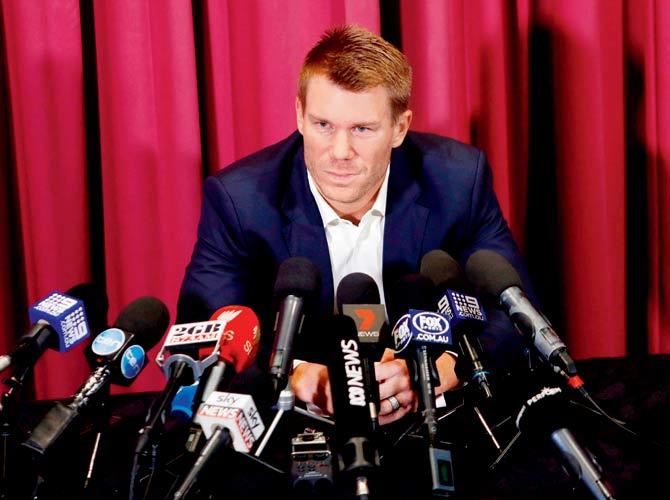Three Australian cricketers have been vilified for ball-tampering. But professional misconduct can take place in any field. And there are different ways of dealing with such situations


Steve Smith breaks down while admitting his guilt
ADVERTISEMENT
It's yesterday's news that Australian test cricketers Steve Smith, David Warner and Cameron Bancroft have paid a heavy price for a mistake they made at their workplace. The mistake is willful ball-tampering. The workplace, in this case, is a playing field. Their professional career lies in tatters now. It will be 12 months before Smith and Warner - now former captain and vice-captain of the Australian cricket team - are allowed to wear the baggy green cap again. And this is despite the fact that they have both made tearful apologies for their unscrupulous actions. They have both unreservedly admitted their guilt.

That admission, however, has changed the narrative of the story. Up until then, complete indignation was the overriding reaction to their cheating, which is the only word that can be used to describe their behaviour. But when Smith, and then Warner, broke down before the world's media while asking for forgiveness, they were accorded a certain level of sympathy. We saw the two tainted men express regret for the pain they had brought to their fans, country and family. "To see the way my old man's been, and my mum - it hurts," confessed Smith. And when it was his turn, an equally inconsolable Warner said, "I want to apologise to my wife and daughters. Your love means more than anything to me."

Cameron Bancroft. Pics/AFP
It's a terrible situation for them, and Bancroft, to be in. But, making a mistake in a professional capacity is something that happens to the best of us. The question is, how does it impact who we are as human beings? What is the healthiest way to deal with such a scenario? And what course of action should we take to make up for the error, be it as a subordinate who has made it or as a boss tasked with reprimanding his juniors?
Spot the error
That depends entirely on the nature of the error, says psychotherapist Banani Ghosh. There are essentially three types of mistakes, she adds. One is genuine, where the person concerned has made the gaffe unwittingly. Another is willful, where the wrongdoer enters a situation completely aware that what he or she is about to do doesn't conform to acceptable norms of integrity. And the third type of mistake is when it's committed on someone else's instructions. All three, Ghosh says, evokes different responses.
She says, "When a person is making a genuine mistake, he is not aware of what the consequences of his actions will be. So when the error is brought to his notice, his usual response is to say sorry to his superiors. But when the mistake is intentional, the person has complete knowledge of the possible repercussions. So he goes about the situation in such a way that he can hide his actions, hoping he is not caught. But getting caught is bound to happen eventually. And in that scenario, it is usual for the person to get defensive."
Often, she adds, the mistake can be so severe that it can lead to the culprit being handed the pink slip. "The main psychological impact in such cases is severe guilt. But what also happens is that when word spreads about the sacking, the person concerned can get into severe depression. He then starts justifying his mistake. But if his alibis are rejected, the depression can turn into a complete breakdown. That, in turn, can lead to something as drastic as suicide. This isn't necessary, of course. It depends completely on the person's mental constitution. But what I have also seen is people turning extremely violent. This is because they have not been able to maintain the image that they had tried to build in their personal life. And violence is thus a way for them to salvage their sense of power. I have seen this happen mostly with men, however. Women, on the other hand, tend to become really withdrawn in such cases."
A social thing
The crux of the problem, Ghosh continues, lies in skewed societal upbringing. "Say, you have made a mistake but you are not sure about it, as it can be sometimes. As your superior, I should then tell you, 'Look, I think that you might have made a mistake here.' But that's not how we talk. We say things straight up. 'You have made a mistake, you have done this thing wrong.' Our upbringing has been such that we have been taught to not do things that will make people point a finger at us. That is the sort of strange education that society gives us. For instance, when a child is crying, we don't normally ask him or her, 'What's happened to you, why are you crying?' Instead, we say, 'Don't cry, what will people say?' So, we end up looking at ourselves through society's eyes, and maintain an image that we build."
That image has now cracked for the three Australian cricketers. But their tears, Ghosh tells us, might not be born out of sorrow or guilt alone. "See, we don't know whether they had been tampering balls earlier or not. But we do know that they did it this time voluntarily. They might have done it before and got away with it. And they might have thought, 'Okay, we will get away with it this time too.' But they did not. And what they did was aimed at winning something, it was meant to hurt someone else. But now, they are forced to admit defeat. That has led to them facing a sense of humiliation about themselves. They are now forced to look at themselves in the mirror and ask, 'Is this who I really am?' So, the imaginary image they had built for themselves, an image that was born out of fantasy, is now shattered. And that's what they are not being able to deal with."

'My employee's mistakes are regular, but genuine'
An accountant on Abhijeet Chakravarty's team for his solar panel business is known to make regular mistakes. Chakravarty says, "In fact, I had to have a severe word with him just two hours ago, since he made an accounting error while filing my taxes. But the only reason I was harsh with him is because he was not ready to accept his mistake, and made excuses after I had pointed it out. This person wouldn't have been able to keep his job in any other company. But I didn't fire him because he is an old man, and won't be able to find another job. Also, the mistakes he makes might be regular, but they are genuine. I also would have been forced to sack him had his errors led to losses for the company. But that hasn't happened yet, thankfully."

'My boss hurt my confidence'
Pooja Sinha Roy is a brand consultant. She tells us that she once got the name of a client wrong in a presentation. This led to a sticky situation with her boss, who wasn't the easiest person to deal with. "My first response was to apologise profusely to the client. And I got him a free ticket to a conclave as a way to make up for it. But my boss hauled me up. Everything was fine eventually with the client. But my boss told me, 'Next time, let's not make the mistake of giving people free things,' without understanding that the 'free thing' ultimately helped us save the client. Plus, my boss had gone through the presentation thrice herself, and she didn't catch the error. I hoped that in a situation like this, she didn't hurt my confidence and self-esteem," Roy says.
Catch up on all the latest Mumbai news, crime news, current affairs, and also a complete guide on Mumbai from food to things to do and events across the city here. Also download the new mid-day Android and iOS apps to get latest updates
 Subscribe today by clicking the link and stay updated with the latest news!" Click here!
Subscribe today by clicking the link and stay updated with the latest news!" Click here!






